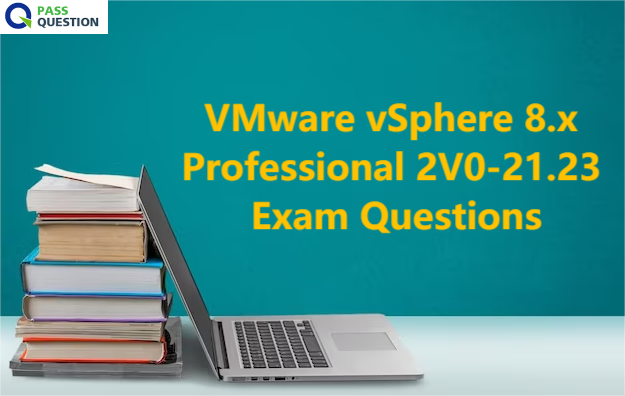VMware vSphere 8.x Professional 2V0-21.23 Exam Questions
If you are looking for a way to validate your skills and knowledge in VMware vSphere 8.x, you might be interested in the VMware Certified Professional - Data Center Virtualization 2023 (VCP-DCV 2023) certification. Using PassQuestion latest VMware vSphere 8.x Professional 2V0-21.23 Exam Questions can help you achieve your goal of passing the exam and getting your VCP-DCV 2023 certification. These VMware vSphere 8.x Professional 2V0-21.23 Exam Questions provide comprehensive coverage of all the exam objectives and are designed to simulate the actual exam. By using PassQuestion VMware vSphere 8.x Professional 2V0-21.23 Exam Questions, you can pass your exam successfully and get VCP-DCV 2023 certification.

VMware vSphere 8.x Professional
VMware vSphere 8.x Professional exam validates a candidate's ability to install, configure, manage, operate and maintain a vSphere 8.x infrastructure. To earn this certification, you need to pass one of the two available exams: VMware vSphere 8.x Professional (2V0-21.23) or Professional VMware vSphere 7.x (2V0-21.20). The latter exam will retire on January 31, 2024, so you might want to consider taking the former exam instead.
The VMware vSphere 8.x Professional exam consists of 70 questions and has a passing score of 300 using a scaled method. You have 135 minutes to complete the exam, which covers topics such as vCenter architecture, storage concepts, networking concepts, security concepts, resource management, backup and recovery, troubleshooting and more.
You should master the following objectives to best prepare for your test:
Section 1 – Architecture and Technologies
Section 2 – Products and Solutions
Section 3 – Planning and Designing
Section 4 – Installing, Configuring, and Setup
Section 5 – Performance-tuning, Optimization, and Upgrades
Section 6 – Troubleshooting and Repairing
Section 7 – Administrative and Operational Tasks
Advantages of Using PassQuestion Practice Test Questions
Using PassQuestion's 2V0-21.23 practice test questions provides several advantages. Firstly, you get access to the latest and most accurate questions, ensuring that you are prepared for the exam. Secondly, the practice test questions provide comprehensive coverage of all the exam objectives. This means that you get a better understanding of the exam topics and can identify areas where you need to improve. Finally, using practice test questions helps to build your confidence and reduce exam anxiety.
View Online VMware vSphere 8.x Professional 2V0-21.23 Free Questions
1. A vSphere cluster has three DNS server virtual machines (VMs). These VMs provide DNS services and can run on any host in the cluster. The administrator must ensure that DNS services are available at all times, even if one or more hosts in the cluster fails.
Which type of rule must the administrator create to meet this requirement?
A. A VM-VM affinity rule
B. A VM-VM anti-affinity rule
C. A VM-Host affinity, preferential rule
D. A VM-Host anti-affinity, preferential rule
Answer: B
2. An administrator is tasked with creating a copy of a virtual machine (VM) running in Microsoft Hyper-V. A developer must be able to run a local copy of this VM on their laptop. The following constraints apply:
- The laptop is part of the same domain as VMware vCenter.
- The laptop is not connected to the network on which the software-defined data center (SSDC. is placed.
- The copy of the VM must be able to run in VMware Workstation.
How can the administrator enable the developer to run the VM in VMware Workstation?
A. Export the VM from Microsoft's Hyper-V server, export the VM and import the VM into VMware Workstation.
B. Use VMware vCenter Convertor, convert the VM to the right format, export the VM and deploy on VMware Workstation.
C. Export a backup of the VM and import the backup into VMware Workstation.
D. Create a clone of the VM, export the clone of the VM and import into VMware Workstation.
Answer: B
3. An administrator has enabled vSphere Cluster Services (vCLS) Retreat Mode on a cluster with three ESXi hosts. What will be the impact of this change in the event of a host failure?
A. vSphere High Availability (HA. Optimal Placement will not be available on the cluster.
B. vSphere Distributed Resource Scheduler (DRS) will be set to disabled on the cluster.
C. vSphere High Availability (HA. will be set to disabled on the cluster.
D. Enhanced vMotion Compatibility (EVC. will not be available on the cluster.
Answer: A
4. An administrator configures a vSphere cluster to use vSphere Lifecycle Manager images for managing host version compliance. Which action should the administrator take to find the latest verified software available in the vSphere Lifecycle Manager depot?
A. Check hardware compatibility
B. Check compliance
C. Check for recommended images
D. Manage depot overrides
Answer: C
5. When configuring vCenter Identity Provider Federation in vSphere, which three pieces of information are required? (Choose three.)
A. LDAP Address
B. Client Identifier for the application group
C. Shared Secret for the application group
D. Server Application Name
E. One Time Passcode
F. OpenID Address
Answer: B, C, F
6. Which two things should an administrator consider when tasked with deploying new encrypted virtual machines into an existing VMware vSphere environment? (Choose two.)
A. VM encryption is only supported when a datastore is backed by Self-Encrypting Drives (SEDs).
B. All virtual machine data (excluding swap files) is encrypted when using VM encryption.
C. Once encrypted, the process of unencrypting a virtual machine is destructive.
D. VM encryption works uniformly across all supported guest operating systems.
E. All virtual machine data (including swap files) is encrypted when using VM encryption.
Answer: D, E
- TOP 50 Exam Questions
-
Exam
All copyrights reserved 2026 PassQuestion NETWORK CO.,LIMITED. All Rights Reserved.

